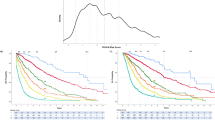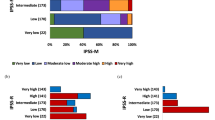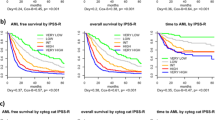Abstract
Established prognostic tools in patients with myelodysplastic syndromes (MDS) were largely derived from untreated patient cohorts. Although azanucleosides are standard therapies for higher-risk (HR)-MDS, the relative prognostic performance of existing prognostic tools among patients with HR-MDS receiving azanucleoside therapy is unknown. In the MDS Clinical Research Consortium database, we compared the prognostic utility of the International Prognostic Scoring System (IPSS), revised IPSS (IPSS-R), MD Anderson Prognostic Scoring System (MDAPSS), World Health Organization-based Prognostic Scoring System (WPSS) and the French Prognostic Scoring System (FPSS) among 632 patients who presented with HR-MDS and were treated with azanucleosides as the first-line therapy. Median follow-up from diagnosis was 15.7 months. No prognostic tool predicted the probability of achieving an objective response. Nonetheless, all five tools were associated with overall survival (OS, P=0.025 for the IPSS, P=0.011 for WPSS and P<0.001 for the other three tools). The corrected Akaike Information Criteria, which were used to compare OS with the different prognostic scoring systems as covariates (lower is better) were 4138 (MDAPSS), 4156 (FPSS), 4196 (IPSS-R), 4186 (WPSS) and 4196 (IPSS). Patients in the highest-risk groups of the prognostic tools had a median OS from diagnosis of 11−16 months and should be considered for up-front transplantation or experimental approaches.
This is a preview of subscription content, access via your institution
Access options
Subscribe to this journal
Receive 12 print issues and online access
$259.00 per year
only $21.58 per issue
Buy this article
- Purchase on Springer Link
- Instant access to full article PDF
Prices may be subject to local taxes which are calculated during checkout



Similar content being viewed by others
References
Tefferi A, Vardiman JW . Myelodysplastic syndromes. N Engl J Med 2009; 361: 1872–1885.
Vardiman JW, Thiele J, Arber DA, Brunning RD, Borowitz MJ, Porwit A et al. The 2008 revision of the World Health Organization (WHO) classification of myeloid neoplasms and acute leukemia: rationale and important changes. Blood 2009; 114: 937–951.
Raza A, Galili N . The genetic basis of phenotypic heterogeneity in myelodysplastic syndromes. Nat Rev Cancer 2012; 12: 849–859.
Malcovati L, Papaemmanuil E, Ambaglio I, Elena C, Galli A, Della Porta MG et al. Driver somatic mutations identify distinct disease entities within myeloid neoplasms with myelodysplasia. Blood 2014; 124: 1513–1521.
Cazzola M, Della Porta MG, Malcovati L . The genetic basis of myelodysplasia and its clinical relevance. Blood 2013; 122: 4021–4034.
Zeidan AM, Linhares Y, Gore SD . Current therapy of myelodysplastic syndromes. Blood Rev 2013; 27: 243–259.
Greenberg P, Cox C, LeBeau MM, Fenaux P, Morel P, Sanz G et al. International scoring system for evaluating prognosis in myelodysplastic syndromes. Blood 1997; 89: 2079–2088.
Zeidan AM, Gore SD, Padron E, Komrokji RS . Current state of prognostication and risk stratification in myelodysplastic syndromes. Curr Opin Hematol 2015; 22: 146–154.
Malcovati L, Germing U, Kuendgen A, Della Porta MG, Pascutto C, Invernizzi R et al. Time-dependent prognostic scoring system for predicting survival and leukemic evolution in myelodysplastic syndromes. J Clin Oncol 2007; 25: 3503–3510.
Kantarjian H, O'Brien S, Ravandi F, Cortes J, Shan J, Bennett JM et al. Proposal for a new risk model in myelodysplastic syndrome that accounts for events not considered in the original International Prognostic Scoring System. Cancer 2008; 113: 1351–1361.
Greenberg PL, Tuechler H, Schanz J, Sanz G, Garcia-Manero G, Sole F et al. Revised international prognostic scoring system for myelodysplastic syndromes. Blood 2012; 120: 2454–2465.
Zeidan AM, Komrokji RS . There's risk, and then there's risk: the latest clinical prognostic risk stratification models in myelodysplastic syndromes. Curr Hematol Malig Rep 2013; 8: 351–360.
Fenaux P, Mufti GJ, Hellstrom-Lindberg E, Santini V, Finelli C, Giagounidis A et al. Efficacy of azacitidine compared with that of conventional care regimens in the treatment of higher-risk myelodysplastic syndromes: a randomised, open-label, phase III study. Lancet Oncol 2009; 10: 223–232.
Silverman LR, Demakos EP, Peterson BL, Kornblith AB, Holland JC, Odchimar-Reissig R et al. Randomized controlled trial of azacitidine in patients with the myelodysplastic syndrome: a study of the cancer and leukemia group B. J Clin Oncol 2002; 20: 2429–2440.
Kornblith AB, Herndon JE 2nd, Silverman LR, Demakos EP, Odchimar-Reissig R, Holland JF et al. Impact of azacytidine on the quality of life of patients with myelodysplastic syndrome treated in a randomized phase III trial: a Cancer and Leukemia Group B study. J Clin Oncol 2002; 20: 2441–2452.
Silverman LR, McKenzie DR, Peterson BL, Holland JF, Backstrom JT, Beach CL et al. Further analysis of trials with azacitidine in patients with myelodysplastic syndrome: studies 8421, 8921, and 9221 by the Cancer and Leukemia Group B. J Clin Oncol 2006; 24: 3895–3903.
Kantarjian H, Oki Y, Garcia-Manero G, Huang X, O'Brien S, Cortes J et al. Results of a randomized study of 3 schedules of low-dose decitabine in higher-risk myelodysplastic syndrome and chronic myelomonocytic leukemia. Blood 2007; 109: 52–57.
Lubbert M, Suciu S, Baila L, Ruter BH, Platzbecker U, Giagounidis A et al. Low-dose decitabine versus best supportive care in elderly patients with intermediate- or high-risk myelodysplastic syndrome (MDS) ineligible for intensive chemotherapy: final results of the randomized phase III study of the European Organisation for Research and Treatment of Cancer Leukemia Group and the German MDS Study Group. J Clin Oncol 2011; 29: 1987–1996.
Steensma DP, Baer MR, Slack JL, Buckstein R, Godley LA, Garcia-Manero G et al. Multicenter study of decitabine administered daily for 5 days every 4 weeks to adults with myelodysplastic syndromes: the alternative dosing for outpatient treatment (ADOPT) trial. J Clin Oncol 2009; 27: 3842–3848.
Lyons RM, Cosgriff TM, Modi SS, Gersh RH, Hainsworth JD, Cohn AL et al. Hematologic response to three alternative dosing schedules of azacitidine in patients with myelodysplastic syndromes. J Clin Oncol 2009; 27: 1850–1856.
Zeidan AM, Kharfan-Dabaja MA, Komrokji RS . Beyond hypomethylating agents failure in patients with myelodysplastic syndromes. Curr Opin Hematol 2014; 21: 123–130.
Prebet T, Gore SD, Esterni B, Gardin C, Itzykson R, Thepot S et al. Outcome of high-risk myelodysplastic syndrome after azacitidine treatment failure. J Clin Oncol 2011; 29: 3322–3327.
Jabbour E, Garcia-Manero G, Batty N, Shan J, O'Brien S, Cortes J et al. Outcome of patients with myelodysplastic syndrome after failure of decitabine therapy. Cancer 2010; 116: 3830–3834.
Steensma DP . Can hypomethylating agents provide a platform for curative therapy in myelodysplastic syndromes? Best Pract Res Clin Haematol 2012; 25: 443–451.
Zeidan AM, Lee JW, Prebet T, Greenberg P, Sun Z, Juckett M et al. Platelet count doubling after the first cycle of azacitidine therapy predicts eventual response and survival in patients with myelodysplastic syndromes and oligoblastic acute myeloid leukaemia but does not add to prognostic utility of the revised IPSS. Br J Haematol 2014; 167: 62–68.
Zeidan AM, Lee JW, Prebet T, Greenberg P, Sun Z, Juckett M et al. Comparison of the prognostic utility of the revised International Prognostic Scoring System and the French Prognostic Scoring System in azacitidine-treated patients with myelodysplastic syndromes. Br J Haematol 2014; 166: 352–359.
Itzykson R, Thepot S, Quesnel B, Dreyfus F, Beyne-Rauzy O, Turlure P et al. Prognostic factors for response and overall survival in 282 patients with higher-risk myelodysplastic syndromes treated with azacitidine. Blood 2011; 117: 403–411.
Itzykson R, Thepot S, Quesnel B, Dreyfus F, Recher C, Wattel E et al. Long-term outcome of higher-risk MDS patients treated with azacitidine: an update of the GFM compassionate program cohort. Blood 2012; 119: 6172–6173.
Cheson BD, Greenberg PL, Bennett JM, Lowenberg B, Wijermans PW, Nimer SD et al. Clinical application and proposal for modification of the International Working Group (IWG) response criteria in myelodysplasia. Blood 2006; 108: 419–425.
Faltas B, Zeidan A, Gergis U . Myelodysplastic syndromes: toward a risk-adapted treatment approach. Expert Rev Hematol 2013; 6: 611–624.
Ma X, Does M, Raza A, Mayne ST . Myelodysplastic syndromes: incidence and survival in the United States. Cancer 2007; 109: 1536–1542.
Ma X . Epidemiology of myelodysplastic syndromes. Am J Med 2012; 125: S2–S5.
Zeidan AM, Gore SD, McNally DL, Baer MR, Hendrick F, Mahmoud D et al. Lenalidomide performance in the real world: patterns of use and effectiveness in a Medicare population with myelodysplastic syndromes. Cancer 2013; 119: 3870–3878.
Sekeres MA . Epidemiology, natural history, and practice patterns of patients with myelodysplastic syndromes in 2010. J Natl Compr Cancer Netw 2011; 9: 57–63.
Gore SD, Fenaux P, Santini V, Bennett JM, Silverman LR, Seymour JF et al. A multivariate analysis of the relationship between response and survival among patients with higher-risk myelodysplastic syndromes treated within azacitidine or conventional care regimens in the randomized AZA-001 trial. Haematologica 2013; 98: 1067–1072.
Itzykson R, Fenaux P . Predicting the outcome of patients with higher-risk myelodysplastic syndrome treated with hypomethylating agents. Leuk Lymphoma 2012; 53: 760–762.
Wang R, Gross CP, Frick K, Xu X, Long J, Raza A et al. The impact of hypomethylating agents on the cost of care and survival of elderly patients with myelodysplastic syndromes. Leuk Res 2012; 36: 1370–1375.
Garcia-Delgado R, de Miguel D, Bailen A, Gonzalez JR, Bargay J, Falantes JF et al. Effectiveness and safety of different azacitidine dosage regimens in patients with myelodysplastic syndromes or acute myeloid leukemia. Leuk Res 2014; 38: 744–750.
van der Helm LH, Alhan C, Wijermans PW, van Marwijk Kooy M, Schaafsma R, Biemond BJ et al. Platelet doubling after the first azacitidine cycle is a promising predictor for response in myelodysplastic syndromes (MDS), chronic myelomonocytic leukaemia (CMML) and acute myeloid leukaemia (AML) patients in the Dutch azacitidine compassionate named patient programme. Br J Haematol 2011; 155: 599–606.
Lee EJ, Zeidan AM . Genome sequencing in myelodysplastic syndromes: can molecular mutations predict benefit from hypomethylating agent therapy? Expert Rev Hematol 2015; 8: 155–158.
Breccia M, Loglisci G, Cannella L, Finsinger P, Mancini M, Serrao A et al. Application of French prognostic score to patients with International Prognostic Scoring System intermediate-2 or high risk myelodysplastic syndromes treated with 5-azacitidine is able to predict overall survival and rate of response. Leuk Lymphoma 2012; 53: 985–986.
Bejar R, Lord A, Stevenson K, Bar-Natan M, Perez-Ladaga A, Zaneveld J et al. TET2 mutations predict response to hypomethylating agents in myelodysplastic syndrome patients. Blood 2014; 124: 2705–2712.
Traina F, Visconte V, Elson P, Tabarroki A, Jankowska AM, Hasrouni E et al. Impact of molecular mutations on treatment response to DNMT inhibitors in myelodysplasia and related neoplasms. Leukemia 2014; 28: 78–87.
Bejar R . Clinical and genetic predictors of prognosis in myelodysplastic syndromes. Haematologica 2014; 99: 956–964.
Grinblatt DL, Sekeres MA, Komrokji RS, Swern AS, Sullivan KA, Narang M . Patients with myelodysplastic syndromes treated with azacitidine in clinical practice: the AVIDA registry. Leuk Lymphoma 2015; 56: 887–895.
Acknowledgements
We would like to thank the patients who contributed to this large database and their families, as well the research coordinators in the six sites who worked to construct the database. The authors would also like to thank the Evans Foundation and the Aplastic Anemia and Myelodysplastic Syndromes Foundation for supporting the research activities of the MDS Clinical Research Consortium. This research was presented in part at the American Society of Hematology 56th Annual meeting in San Francisco, CA, USA in December 2014. AMZ received funding through MDS Clinical Research Consortium and the American Society of Oncology Young Investigator Award.
Author contributions
AMZ conceived the study concept, analyzed the data and wrote the manuscript. MAS, GG-M, DPS and RK contributed data to the study, analyzed the data and revised the manuscript. KZ and JB analyzed the data, performed the statistical analyses and contributed to manuscript writing. NAA and CZ collected data and reviewed the manuscript. GR, AZ, AN, EJ, HK, SDG, JPM and AL contributed data to the study and reviewed the manuscript. All the authors reviewed the manuscript and approved the final version.
Author information
Authors and Affiliations
Consortia
Corresponding author
Ethics declarations
Competing interests
The authors declare no conflict of interest.
Additional information
Supplementary Information accompanies this paper on the Leukemia website
Supplementary information
Rights and permissions
About this article
Cite this article
Zeidan, A., Sekeres, M., Garcia-Manero, G. et al. Comparison of risk stratification tools in predicting outcomes of patients with higher-risk myelodysplastic syndromes treated with azanucleosides. Leukemia 30, 649–657 (2016). https://doi.org/10.1038/leu.2015.283
Received:
Revised:
Accepted:
Published:
Issue Date:
DOI: https://doi.org/10.1038/leu.2015.283
This article is cited by
-
Predictive value of DNA methylation patterns in AML patients treated with an azacytidine containing induction regimen
Clinical Epigenetics (2023)
-
Current Therapeutic Landscape in Lower Risk Myelodysplastic Syndromes
Current Treatment Options in Oncology (2023)
-
Treatment of myelodysplastic syndromes in the era of precision medicine and immunomodulatory drugs: a focus on higher-risk disease
Journal of Hematology & Oncology (2022)
-
Assessing the role of venetoclax in combination with hypomethylating agents in higher risk myelodysplastic syndrome
Blood Cancer Journal (2022)
-
Prospective comparison of 5- and 7-day administration of azacitidine for myelodysplastic syndromes: a JALSG MDS212 trial
International Journal of Hematology (2022)



